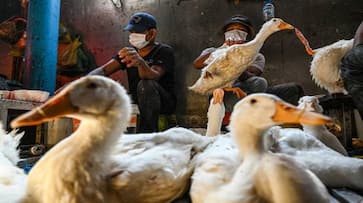Experts expressed fear about the bird flu pandemic's potential quick spread, which may result in an extremely high fatality rate and be "100 times worse than the Covid pandemic," according to the Daily Mail, a UK tabloid.
Concerns have grown about the possible danger posed by H5N1 bird flu. According to the Daily Mail, experts warn that a pandemic might be 100 times worse than COVID.
Dr. Suresh Kuchipudi, a well-known bird flu expert in Pittsburgh, said at the briefing that the H5N1 flu has the potential to cause a pandemic since it can infect a wide range of mammals, including humans.
Another scientist, John Fulton, commented, "This looks to be 100 times worse than COVID, or it may be if it evolves and maintains its high case fatality rate." Once it has mutated to infect people, we can only hope that the fatality rate decreases."
According to certain media reports, bird flu has resulted in serious or deadly infections among people who have had direct contact with wild birds or chickens.
At present, H5N1 cannot easily spread among humans, but scientists are keeping an eye out for mutations that could facilitate human dissemination and ignite a pandemic.
What is the bird flu?
Type A H5N1, the bird flu virus that is currently gaining attention, was first identified in 1959. Since 2020, the virus has spread to additional animal species, including dogs and cats, in various nations. Bird flu is a respiratory virus. According to the CDC, in severe situations, it can lead to pneumonia.
What are the symptoms of bird flu?
Coughing, physical aches, and fever are common symptoms of the flu. While some people may not show any symptoms, others may get acute pneumonia that is life-threatening.
Patients infected with bird flu are often treated with supportive care and, in extreme cases, ventilators to assist them breathe.
How do I take precautions against bird flu?
1. To kill the virus, cook poultry items thoroughly.
2. Wash your hands with soap and water on a regular basis to maintain healthy hygiene.
3. Avoid making contact with sick or deceased birds and their waste.
4. Unwashed hands should not come into contact with the eyes, nose, or mouth.
5. When dealing with sick or dead birds, wear personal protection equipment.
6. Stay informed about H5N1 epidemics and adhere to public health guidelines.
7. Maintain adequate respiratory hygiene by covering your mouth and nose when coughing or sneezing.
Last Updated Apr 5, 2024, 11:14 AM IST









![Salman Khan sets stage on fire for Anant Ambani, Radhika Merchant pre-wedding festivities [WATCH] ATG](https://static-gi.asianetnews.com/images/01hr1hh8y86gvb4kbqgnyhc0w0/whatsapp-image-2024-03-03-at-12-24-37-pm_100x60xt.jpg)
![Pregnant Deepika Padukone dances with Ranveer Singh at Anant Ambani, Radhika Merchant pre-wedding bash [WATCH] ATG](https://static-gi.asianetnews.com/images/01hr1ffyd3nzqzgm6ba0k87vr8/whatsapp-image-2024-03-03-at-11-45-35-am_100x60xt.jpg)


